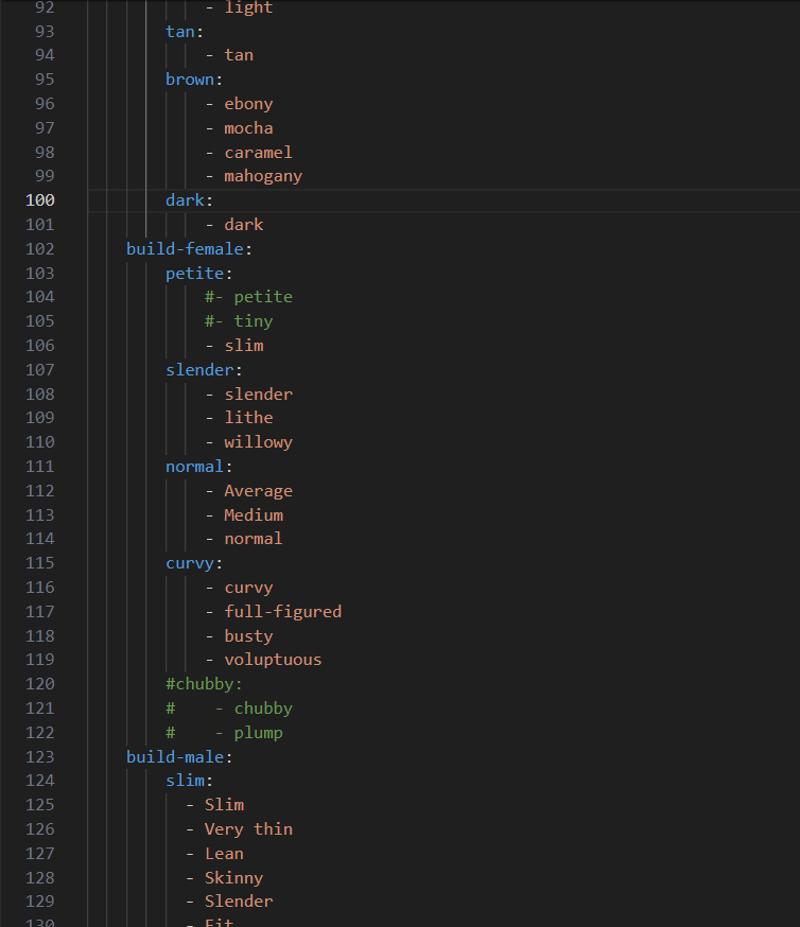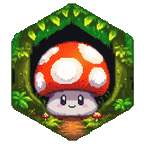1. Introduction
Hi everyone, this user guide is intended to :
Explain very briefly what a dynamic wildcard is
Go through the different wildcard types
How to use my wildcards
List the different wildcards by type (with link to the page)
What's yaml ?
YAML is commonly used as a configuration file.
You can open it with Notepad++, it's basically a text file.
Mine are written so the content is divided in sections imbricated with subsections, with a list of values at the deepest level.
There is nothing much to say about YAML. But the value in these files is that some developers coded plugins to handle them as wildcards. This, with the added possibility of handling a new synthax in the wildcard, thus making them dynamic.
Check the tutorial links below if you want to know more about the synthax, it involves the use of special characters to call the functions that the developers have implemented inside their plugins.
Plugin installation
Install this for A1111/Forge: https://github.com/adieyal/sd-dynamic-prompts
tutorial: https://github.com/adieyal/sd-dynamic-prompts/blob/main/docs/tutorial.md
video tutorial: https://www.youtube.com/watch?v=bQK5diN59NA
Install this for ComfyUI: https://github.com/ltdrdata/ComfyUI-Impact-Pack
Prompt examples with wildcards
(medium full shot) of
shrek __cf-police-officer/prompt-costume__,
performing an arrest,
set in __cof-location/place/*__, at __cof-location/timeofday/all__,
best quality, masterpiece(medium full shot) of
__crea-*/prompt-full__,
best quality, masterpiece2. Categorization & Megapack
Let's begin by saying that the megapack contains all the wildcards presented below (basemodel, locations, costumes, creatures, objects, scenes), available in two formats:
a bundle with all the files
a single file version aka AllInOne
I have decided to use different prefixes for the wildcards about costumes, creatures, objects and scenes. This and the distribution of each wildcard in one type or another is a personal choice that I made for my own convenience. Like for example writing the mermaid wildcard as a creature, and not as a costume wildcard.
3. Basemodel
I have written a basemodel wildcard that is used by the costume wildcards, but you can use it as a standalone wildcard for prompting variants for a man or woman.
It contains nationalities, skin tones, body builds (15 for female and 23 for male), eye color (+15), hair styles (+40 for female, 45 for male), hair color, hair length, hair texture.
This is a list of some of the commands :
__cof-basemodel/gender__ : call for either a full male or female prompt
__cof-basemodel/gender-female__ : call for a full female prompt
__cof-basemodel/gender-male__ : call for a full male prompt
__cof-basemodel/age__ : from young to old
__cof-basemodel/ethnicity__ : call for a selected nationality + skin tone + eye color
__cof-basemodel/nationality/*__ : nationalities
__cof-basemodel/skin-tone/*__ : skin tones
__cof-basemodel/build-female/*__ : female body builds
__cof-basemodel/build-male/*__ : male body builds
__cof-basemodel/eye-color/*__ : eye colors
__cof-basemodel/hairstyle-female__ : female hairstyles
__cof-basemodel/hairstyle-male__ : male hairstyles
__cof-basemodel/hairstyle-punk__ : punk hairstyles
__cof-basemodel/hair-color/*__ : hair colors
__cof-basemodel/hair-length/*__ : hair length
__cof-basemodel/hair-texture/*__ : hair textureConfiguring the basemodel
You should edit the wildcard with a text editor (ex: Notepad++ or Visual Studio Code) to disable the options that you don't want to prompt, such as some hairstyles, some body builds or even a gender in case you want to prompt exclusively a man (or a woman).
To do this you can either delete the line, or the preferred method, comment the line in case you want to switch back later. To comment a line you add the special character # in front. Do not forget to restart your web-ui server afterward since the wildcards are loaded on launch :

4. Locations
I have moved all the locations from the costume, creature and object wildcards to this single wildcard. And I added some options for weather, season and time of the day.
At the moment I'm writing this article there is more than 770 different locations, each with several variants for a total of +5150 prompts for places.
You should call this wildcard at the end of your prompt to define a setting. Keep in mind that describing too much a setting force Stable Diffusion to lose the focus from you main target when generating an image.
This is a list of the commands :
__cof-location/place/*__ : a random place
__cof-location/weather__ : a random weather
__cof-location/season__ : a random season
__cof-location/timeofday/all__ : a random time of the day5. Costumes
Costumes wildcards prompt a costume on a theme with a lot of variants about the costume.
The costume wildcards are called with the following, commands (example for mistress):
__cf-mistress/prompt-costume__ : prompt only the mistress costume
__cf-mistress/prompt-full__ : prompt the costume with a character and locationIf you have multiple costumes wildcards or the Megapack, you can use these commands to call any costume wildcard:
__cf-*/prompt-costume__ : prompt any costume
__cf-*/prompt-full__ : prompt any costume with a character and locationcostume wildcard list
6. Creatures
Creature wildcards prompt a creature with a lot of variants about the creature.
The creature wildcards are called with the following, commands (example for alien):
__crea-alien/prompt-creature__ : prompt only the creature
__crea-alien/prompt-full__ : prompt the creature with a locationIf you have multiple creature wildcards or the Megapack, you can use these commands to call any creature wildcard:
__crea-*/prompt-creature__ : prompt any creature
__crea-*/prompt-full__ : prompt any creature with a locationcreature wildcard list
aquatic creature - crea-aquatic
7. Objects
Object wildcards prompt an object with a lot of variants about the object.
The object wildcards are called with the following, commands (example for the cake):
__cornf-cake/prompt-object__ : prompt only the object
__cornf-cake/prompt-full__ : prompt the object with a locationIf you have multiple object wildcards or the Megapack, you can use these commands to call any object wildcard:
__cornf-*/prompt-object__ : prompt any object
__cornf-*/prompt-full__ : prompt any object with a locationobject wildcard list
8. Scenes
Scene wildcards prompt a scene based on a theme with a subject, a location and some actions.
The scene wildcards are called with the following, commands (example for the fantasy scene):
__cof-scene-fantasy/prompt-costume__ : prompt for a fantasy scene with a costume wildcard
__cof-scene-fantasy/prompt-creature__ : prompt for a fantasy scene with a creature wildcard
__cof-scene-fantasy/prompt-full__ : prompt the fantasy scene with a characterIf you have multiple scene wildcards or the Megapack, you can use these commands to call any scene wildcard:
__cof-scene-*/prompt-costume__ : prompt for any scene with any costume
__cof-scene-*/prompt-creature__ : prompt for any scene with any creature
__cof-scene-*/prompt-full__ : prompt any scene with a character





